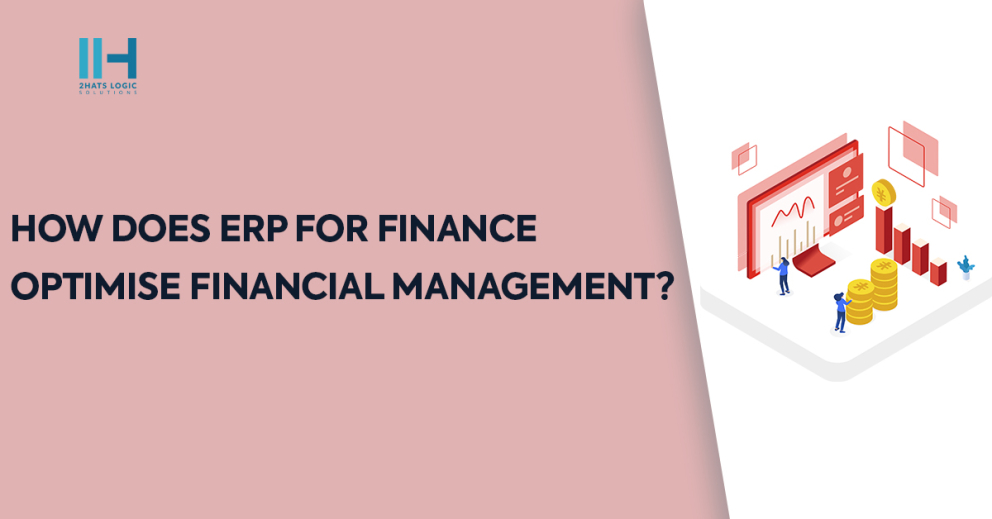Greetings! I'm Aneesh Sreedharan, CEO of 2Hats Logic Solutions. At 2Hats Logic Solutions, we are dedicated to providing technical expertise and resolving your concerns in the world of technology. Our blog page serves as a resource where we share insights and experiences, offering valuable perspectives on your queries.

The most common requirement for sustainable growth and profitability in the business landscape is efficient financial management. Companies adopting either operational efficiency or strategic decision-making often utilise ERP systems in their operations.
In this blog, we look at various features, benefits, implementation strategies, challenges, and future trends of ERP in the domain of finance.
ERP Features for Finance Management
ERP systems offer a robust suite of features tailored to streamline financial processes. These include:
Financial Reporting and Analysis
ERP systems provide several high-end tools that provide real-time insight into the financial performance of an organization. ERP systems gather and process data and provide stakeholders the chance to analyze and make better reports. This provides further support to stakeholders in making good decisions based on timely and relevant information. Advanced tools of analysis are offered to facilitate stakeholders in the analysis and decision-making process.
Accounts Payable and Receivable Management
ERP simplifies the process of accounts payable and receivable by automation. Automated invoicing, easy payment processing, and efficient reconciliation of accounts are also included in it. The elimination of manual work and errors allows acceleration of cash flow cycles and overall financial efficiency for the business.
Budgeting and Forecasting
ERP modules for budgeting and forecasting help finance teams create precise budgets and conduct scenario analyses to predict a business’s financial future. They use past data, market trends, and other factors to make smarter decisions and plan strategically, aiding in risk and opportunity identification. Ultimately, these tools enhance an organization’s agility and resilience in a changing business landscape.
Asset Management
ERP solutions provide powerful asset management capabilities, which enable organizations to track and manage assets throughout their entire lifecycle. This includes asset acquisition, tracking of depreciation, maintenance scheduling, and disposal management. Such optimizes asset utilization and saves on the cost of downtime.
Compliance and Risk Management
The ERP platforms come with built-in controls and compliance features. This ensures that the organizations remain compliant with the requirements and also manage any potential financial risks. The controls include data security, audit trails, segregation of duties, and regulatory reporting functionality. These improve audit readiness and ensure the financial integrity of the organization.
Benefits of ERP in Finance
ERP systems have many things to offer the finance departments. They perform operations with the utmost efficiency and strategic advantage.
Efficiency Gains
The ERP system automates many such repetitive activities within an organization and thus gains operational efficiency very significantly. Activities like invoicing, payment processing, and reporting are often automated so that they reduce the necessity of manual labour and streamline the workflow thus reducing the risk of human error. This highly streamlined efficiency will improve productivity as well as accelerate the task completion time.
Cost Reduction
With streamlined processes, less error in manual processes, and proper utilization of resources, ERP systems help in cost reduction in the finance departments. Tasks like data entry, reconciliation, and reporting are automated, so they reduce unnecessary manpower requirements and operational costs. Furthermore, reduced man-made errors reduce the risk of loss from financial discrepancies.
Improved Decision-making
ERP systems give finance professionals access to real-time data and the best analytics tools. This helps the stakeholders to make quick and correct data-driven decisions. With total insights into financial performance, budgetary trends, and operational metrics, the finance teams can look for growth prospects, resource optimization, and risk management.
Improved Compliance
ERP systems have highly robust compliance features and built-in controls that enforce compliance requirements. With the automation of compliance processes, maintaining audit trails, and enforcing segregation of duties. Helps to significantly reduce risks of non-compliance penalties and reputational damage. Hence, this enhanced compliance capability will increase the confidence among the stakeholders and the regulators.
Scalability
ERP solutions are designed to provide business growth and expansion. Since businesses grow this can scale to take on an increase in transaction volumes, additional users, and new business units or subsidiaries. This scalability will ensure continuous operations and adaptability in dynamic environments. Thus, finance departments can continue to meet new business requirements without disruptions.
How to Choose the Right ERP
The process of selecting the right ERP system starts with a detailed evaluation of organizational needs. Firstly understand the requirements of your organization and list things out. The size of your organization also matters. Other factors are vendor reputation, support services, and integration capabilities. However, the overall needs assessment, defining key requirements, and engaging stakeholders throughout the selection process are very critical steps in selecting the right one aligned with business objectives. You can consider some of the options below
- Laravel ERP System
Businesses looking for a customizable and developer-friendly ERP solution may consider the Laravel ERP system. This is built on the robust Laravel framework. This system provides better flexibility, a rich ecosystem of packages, and seamless integration capabilities.
- Odoo
Another popular choice is Odoo, an open-source ERP framework known for its modular architecture and extensive range of modules covering finance, HR, CRM, and more. Odoo provides a user-friendly interface and strong community support.
- ERPNext
For organizations seeking a comprehensive ERP solution with modules for accounting, HR, inventory, and CRM, ERPNext offers a feature-rich platform. Its open-source nature allows for customization and scalability.
- Microsoft Dynamics 365
Businesses looking for a scalable and cloud-based ERP solution may consider Microsoft Dynamics 365. While not PHP-based like Laravel, Dynamics 365 offers robust financial management capabilities and seamless integration with Microsoft’s suite of productivity tools.
ERP Implementation Tips
Successful ERP implementation hinges on meticulous planning, stakeholder buy-in, and effective change management. Key implementation tips include:
Set Clear Objectives
Define clear objectives and expectations to align the implementation with strategic goals.
Proper Training and Support
To guarantee acceptance and competency, give users thorough training and continuing assistance.
- Data Migration
Execute data migration meticulously to maintain data integrity and continuity of operations.
- Phased Rollout
Implement ERP modules in phases to manage complexity, mitigate risks, and facilitate smoother transitions.
Overcoming ERP Challenges
Some challenges in implementation include problems of resistance to changes, the complexities involved in data migrations, integration issues, and customization requirements. This can be overcome by using strategic methods of communications, stakeholder engagements, robust change management strategies, and the leverage of both vendor expertise and support are some ways that some challenges can be addressed.
Future Trends in ERP for Finance
The future trends of ERP in finance are marked by advancements in artificial intelligence, machine learning, predictive analytics, blockchain technology, and cloud-based solutions.
- Artificial Intelligence (AI) Integration
AI integration within ERP systems helps automate tasks and processes. This will make it easy to derive actionable insights through massive datasets. AI algorithms help simplify processes and optimize efficiency.
- Machine Learning (ML) Capabilities
ML algorithms work continuously to learn data patterns, optimize processes, and deliver predictive capabilities. ML enhances functionalities in predicting trends and outcomes, enabling proactive decision-making.
- Integration of Predictive Analytics
Predictive analytics uses historical data and statistical models to predict the trends and behaviour of the market. Other data like customers, and the financial performance of the company with great accuracy is also used. The foresight brings advantages in the decision-making process as well as risk management strategies.
- Blockchain Technology Adoption
The integration of blockchain technology within ensures secure and tamper-proof financial transactions. The security, transparency, and data integrity in blockchain technology provide an effective way to reduce fraud and ensure trust in transactions.
- Cloud-Based ERP Solutions
Cloud-based ERP solutions have scalability and flexibility with the added ability to provide cost-effectiveness. They enable real-time data access and facilitate seamless collaboration. This enables financial professionals to make the right decision and effectively grow their business.
Conclusion
Enterprise Resource Planning (ERP) systems and their services are the best transformative tools that benefit organizations in several ways. This system helps the finance They streamline finance management by automating processes like accounting, payroll, and budgeting, reducing errors and saving time. Our ERP services provide real-time insights via analytics and reporting, ultimately facilitating strategic growth. It will be able to make your business make informed decisions that quickly respond to market changes. If you need to hire a developer or any other services, just contact us for more information and assistance.
FAQ
What is an ERP finance module?
An ERP finance module is an integral part of an ERP system that manages financial processes, which includes accounting, budgeting, and reporting under one roof.
Why do you need ERP for finance?
ERP for finance helps to streamline financial processes, maintain records within the correct specifications, regulate according to requisite regulations, and provide insight into making valid financial decisions.
How does ERP for Finance Optimize Financial Management?
ERP for finance optimizes the process of financial management by consolidating data, automating tasks, maintaining proper accuracy, and providing timely insights. This facilitates workflow simplification and making profitable financial decisions.
What are the main advantages associated with the use of ERP for Human Resources?
The implementation of ERP for Human Resources provides the facility of centralizing the data of HR, automating the administrative process, and better employee management. Better accuracy of data, along with the support of strategic HR decision-making, are also included.
What are the security measures in place for ERP systems?
ERP systems have security measures, such as role-based access control, data encryption, regular audits, and software patches, to ensure the safety of sensitive data and to maintain system integrity.

Related Articles






